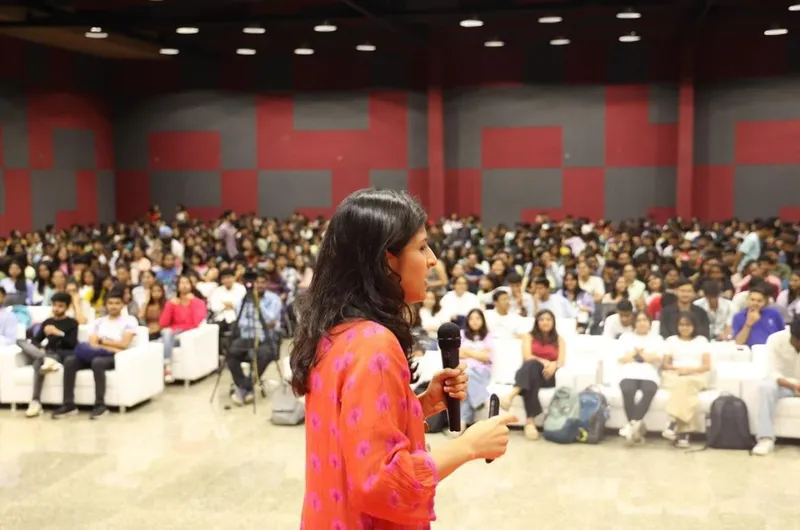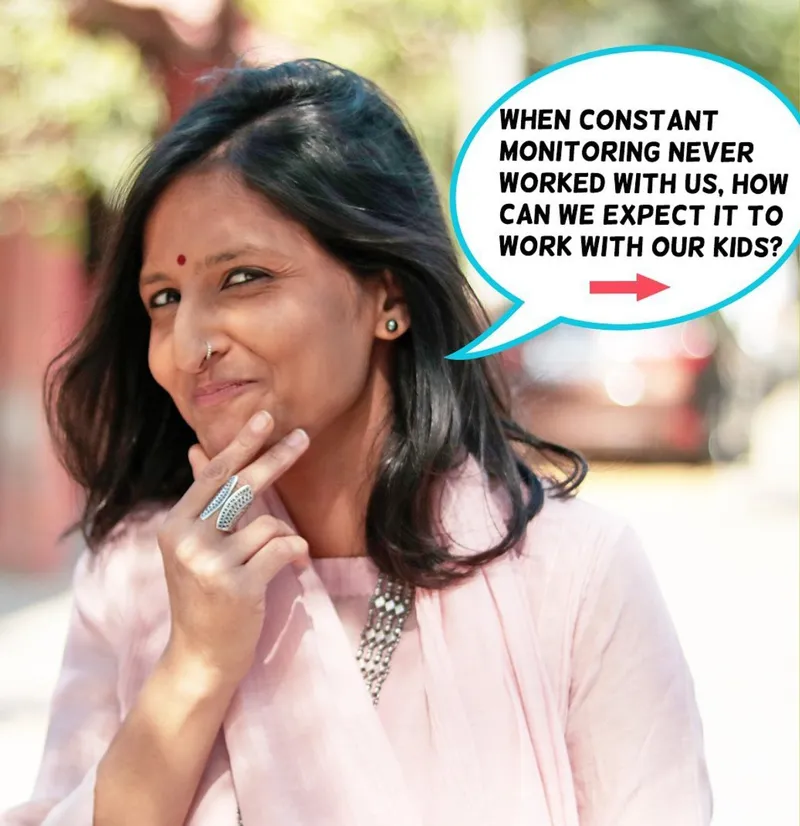Anuja Amin is empowering adults to create abuse-free environments for children
Circles of Safety builds conversations around the human body, boundaries, and sexuality with parents and teachers, helping them address their own history of trauma and abuse before they can help their children heal.
Anuja Amin had a high-profile job in a multinational company in the Netherlands when she decided to change careers and become a sexuality educator working with parents and teachers.
As an important step in this direction, Amin opened up to her parents and her fiancé about the sexual abuse she had been subject to as a child at their joint family home 20 years ago.
“This disclosure was critical to sharing my plan for my future with the people who were important to me,” she says.
More notably, to fulfil her commitment to empowering teachers and parents to be receptive to their children’s stories of abuse, body image, and relationships, Amin had to first start at her own home.
Amin’s journey with Circles of Safety, a sexuality education enterprise she launched in 2020, begins with her childhood.
"I was really, really young,” she recalls, “and nobody had spoken to me about the body and boundaries.”
This lack of awareness and vocabulary made it difficult for Amin to recognise what was happening to her or express her discomfort and confusion.
This personal history ignited her commitment to creating environments where no child would have to live in silence and ignorance, or struggle for years before opening up to their parents.
Abuse can happen anywhere, anytime
Amin describes her upbringing in a supportive and open family, dispelling the myth that sexual abuse only occurs in repressive or conservative households.
However, her parents–although loving and well-meaning–lacked the necessary knowledge to educate her about the potential dangers she faced, even within the seemingly safe confines of her home.

Children, along with their parents and teachers are addressed in Amin's workshops to create a conducive learning environment for them both inside and outside school.
"I don’t blame them,” says Amin, acknowledging that her parents–like many others–were not equipped with the right tools and information to ask these questions or think about them.
Her own experiences underscored the need for education that went beyond mere awareness and encompasses all children and caregivers, regardless of their gender identities and family backgrounds.
“When I finally opened up to my parents, they were first overcome by shock and guilt. However, their willingness to engage in these difficult conversations was relieving and crucial to understanding what such support can do for a child,” says Amin.
Today, her family continues to be a source of strength and advocacy.
“My father often promotes my work in his community, and this has been instrumental to my own healing,” says Amin, who has a bachelor’s of science degree in psychology from the University of Nottingham and a master's in Human Resource Management from the Milan School of Economics.
Building a discourse
Amin’s approach is grounded in the belief that conversations about the body, boundaries, and sexuality need to start early on and become a normal part of daily life. She advocates the use of correct anatomical terms by parents with their children from a young age, thus removing any associated shame.
“This simple but powerful step helps children understand that their bodies are not something to be ashamed of. Preventing sexual abuse begins with fostering a healthy, respectful understanding of sexuality from a young age,” she says.
The Circles of Safety initiative has evolved from a passion project into a social enterprise, driven by Amin’s vision of a world where children too are educated and empowered. Her work is not just about protecting children but also about healing the adults who care for them.
In 2016, in collaboration with schools in Gujarat, Amin began holding sensitisation workshops for adults, including teachers and parents. Many parents, she discovered, had unresolved trauma from their own childhood, which unconsciously influenced how they approached the subject of sexuality.
The realisation that many adults in her workshops were themselves survivors of abuse led her to a critical insight: the cycle of silence and ignorance could only be broken through comprehensive education.
When Amin had started Circles of Safety, she quickly recognised that, for lasting change to happen, she first had to reach out to parents and caregivers. After two years of holding workshops with these model adults in the child’s life, Amin started holding workshops for students, and integrated sensitisation and awareness-building sessions with parents and teachers as part of these workshops.
“I believed that our workshops with children would have a better impact if the adults in their lives caught up to what the kids learnt at these workshops, and thereby created an environment that was fully conducive to their understanding of these topics,” says Amin.
Her workshops provide a space for the adults in a child’s life to confront and begin healing from their past experiences, making them more receptive and capable of having vital conversations with their children.
She recalls a particularly impactful session where she had shared her own story in front of a large audience of teachers and staff. The response was profound; many in the audience were visibly moved and some of them even came forward to share their own experiences. This moment underscored the importance of creating safe spaces where survivors can feel seen and heard, in order to begin their healing journey.
Ensuring awareness and preparedness
Amin identified a significant gap in knowledge and preparedness among teachers and school authorities regarding the Protection of Children from Sexual Offences (POCSO) Act, which mandates schools to have foolproof procedures for reporting and handling incidents of sexual abuse.
She offered to provide the necessary training, thus ensuring that schools not only comply with the law but also create a safe environment for their students.
As Amin delved deeper into her work, she realised that addressing sexual abuse was only one part of a broader issue rooted in societal taboos around sex and sexuality.

On Instagram, Amin breaks down ways to make simple, day-to-day conversations with children more sex and sexuality-positive, and offers micro lessons on body curiosity, confidence, and consent.
Soon schools started requesting her to expand her curriculum to include discussions on changing bodies, consent, and healthy relationships, among other topics. This led Amin to develop a comprehensive sexuality education curriculum, recognising that early and open conversation on these topics was essential for normalising them.
“Anuja is receptive to all kinds of questions from our students that usually get shunned or ignored by the adults in their lives,” says Shivani Raval, Principal of GEMS Genesis International School, Ahmedabad.
“Following every workshop, we see parents, girls and boys wanting to meet her separately and ask questions. We may all not be equipped to answer these difficult questions on our own, but Anuja fills that gap, while also empowering us to understand the significance of say, the LGBT movement, teenage crushes and body curiosity, as educators and responsible adults,” she adds.
In her sessions at schools as with NGOs across the country, and engagement on social media Amin is committed to breaking away from traditional, often gender-segregated approaches to these subjects, which she found inadequate and limiting. “Our sessions are not limited to girls,” she asserts.
Circles of Safety offers the ‘Safer, Smarter, Stronger’ programme, which caters to students of classes 5 to 12. This programme covers a wide array of topics–from body changes and hygiene to reproductive health, consent, and media literacy.
The curriculum is designed to be age-appropriate, building on knowledge and skills as students progress through different stages of development.
Fostering positive attitudes
Amin’s goal is not just to inform but also to foster positive attitudes in young people and empower them to make informed decisions about their bodies and relationships.
“We focus on engaging parents and educators, particularly in preschool years, when there is heightened motivation to impart essential knowledge. We provide the curriculum, resources, and training, supporting the initial implementation before handing over full control to schools,” says Amin.
This approach not only facilitates widespread adoption but also builds capacity within the community, aiming for a future where such education is naturally integrated into every institution.
Then, there is the ‘Safer, Smarter Me’ programme created for adolescents, who learn about everything from changing bodies, reproductive health, and body safety to consent, sexual decision-making, and healthy relationships.
Circles of Safety has received three grants as part of the NSRCEL (Nadathur S. Raghavan Center for Entrepreneurial Learning) Women's Startup Program. However, Amin wants to establish a self-sustainable funding model by empowering parents to invest in and support education that ensures their children’s wellbeing and safety.
“This approach presents a challenging path, but we are committed to advocating the importance of our work and demonstrating its value to families and communities,” says Amin.
Edited by Swetha Kannan






